In early 2020, as soon as the epidemic caused by a novel coronavirus began turning into a global pandemic, everyone, from scientists to politicians and media pundits, was eager to understand where it came from. Conveniently for US President Donald Trump, it came from China. That enabled him to suggest that if it originated in a nation now perceived to be America’s enemy, it was probably a malicious plot designed to weaken his electoral chances.
But the scientific community, relayed by the media, calmly explained that, like earlier examples of the coronavirus, it was transmitted to humans by animals and originated with bats. The essential message could be boiled down to: Trust the scientists, who know what they’re talking about.
A year later, with Trump no longer in the White House, suspicion arose even among many scientists that, well, accidents happen, even among all-knowing scientists. But this accident, if that’s what it was, turned out to be particularly embarrassing, with millions of people dying, the global economy thrown into a tailspin and all the rituals of daily life upended, including such things as children’s education and, more drastically (in terms of loss of income), professional sports.
Do Americans Still Trust Their Public Health Agencies?
When the stakes are so high, suspicion about who and what is to blame takes on a new dimension. The dominant take of 2020 was that it was all about wild animals. The dominant take in the spring of 2021 was that, no, it was people, and specifically scientists, who were the unwitting culprits. Back in 2020, the logic of US politics meant that reasonable people could assume that any assertion by the incumbent president, Donald Trump, known for his addiction to “alternative facts,” was a self-interested lie. Moreover, if a scientist provided a version that contradicted Trump, it was likely to be the truth.
A year later, Trump was gone. The path was cleared for rational public discussions. It became possible to begin weighing evidence before asserting a possibly unfounded opinion. That is when some medically-informed journalists and an increasing number of scientists admitted that human error as the source of COVID-19 was not only possible, but highly credible.
The confusion spawned by this reversal of public discourse led the presumably level-headed President Joe Biden to commission a report from the intelligence community on the true origin of the pandemic. Last week, The Washington Post reported on the initial result of that study. The article stated that “President Biden on Tuesday received a classified report from the intelligence community that was inconclusive about the origins of the novel coronavirus, including whether the pathogen jumped from an animal to a human as part of a natural process, or escaped from a lab in central China, according to two U.S. officials familiar with the matter.”
Today’s Daily Devil’s Dictionary definition:
Inconclusive:
Not quite certain enough yet to be codified and promulgated as an official lie
Contextual Note
If Trump could be counted on to produce any version of the “facts” that suited his agenda, Biden came into office with a confirmed capacity for lying about the facts of his own life — including his educational honors and his stance on the Iraq War — but also with a reputation for largely respecting publicly acknowledged truth. He did, however, out of ordinary political opportunism, give credence to the easily debunked reports about Russians paying bounty to Afghans willing to kill Americans. That was because he knew his fellow Democrats were fond of blaming Russians for all the nation’s ills.
One difference between the two presidents is that Trump was always ready to jump to a conclusion, rejecting the temptation to call anything inconclusive. He painted the world in black and white, from which nuance was excluded. There was, however, one exception. He opposed the CIA’s largely conclusive assessment that Trump’s buddy, Saudi Crown Prince Mohammed bin Salman, had commanded the bone-saw crew who dismembered Washington Post journalist Jamal Khashoggi. On that issue, Trump claimed that the evidence was inconclusive.
Most theories that lead to blaming someone other than the initially designated culprit are routinely deemed inconclusive or labeled as conspiracies to the extent that no smoking gun has been found. Those who cling to the idea that Lee Harvey Oswald was the lone assassin of John F. Kennedy and the soon-to-be-paroled Sirhan Sirhan for the death of Robert Kennedy continue to claim that the mountain of countervailing evidence is inconclusive. In both Kennedy assassinations, the smoke eventually became visible, but the smell of the gunfire had faded. Any forensic traces of actual smoke were of course branded conspiracy theories.
Concerning the report on the origins of COVID-19, the inconclusive assessment appears justified. The case for a lab leak has grown stronger in recent months, but apart from suspicion generated by the fact that the Chinese government has been obstructive, there is no serious evidence to justify it. The Chinese government is by definition obstructive in everything it does, so this could hardly be confused with the kind of exceptional behavior that credibly points toward a coverup.
The Post offers an interesting explanation of another apparent anomaly: “Proponents of that theory point to classified information, first disclosed in the waning days of the Trump administration, that three unidentified workers from the Wuhan Institute of Virology — one of the world’s preeminent research institutions studying coronaviruses — went to the hospital in November 2019 with flu-like symptoms.”
Americans would of course find this suspect, since, given the crippling price of medical treatment in the US, people avoid going to the hospital except in an emergency. The Post helpfully adds: “In China, people visit the hospital for routine and mild illnesses.” Cultural assumptions can always intervene to skew the perception of the meaning of the evidence.
Historical Note
Since COVID-19 is still mutating and raging nearly two years after its outbreak, no one knows when the definitive history of the COVID-19 pandemic will be written. The current wisdom says that, unlike the Spanish flu of a century ago, it will end up not as a chapter of history, with a beginning, a middle and an end, but as an endemic feature of humanity’s pathological landscape.
In contrast, the history of the deep psychological mutations taking place as a result of the pandemic, especially in Western society, is beginning to take shape. Democracy has always lent itself to contestation. Protest has traditionally served to help define the positive dynamics of democracy, where voices could be heard that might influence what Thomas Jefferson once called “the course of human events.” But the pandemic has accelerated a different, far less positive trend, not of constructive protest but of an utter loss of faith not only in civic authority, but also in every other form of authority. Science itself may be the victim.
The secular order imposed by modern formally democratic governments depends to a large extent on the belief in the beneficent authority of science and the sincerity of its representatives, the scientists. In recent decades that authority has been shaken by the role powerful economic actors and complicit politicians have played in manipulating science to serve their purposes. The managers of the economy have become accustomed to using their clout to promote comforting lies about science itself, in the name of “national interest” and the “needs of the economy,” which means the health, not of the planet or its population, but of the mighty enterprises that create (and also destroy) jobs.
It is a well-known fact that in US culture, uncertainty and inconclusiveness are unpopular. That aversion was one of the keys to Trump’s electoral success. Not having a decided opinion on something is often seen as an excuse for not getting things done, which means committing the cardinal sin of wasting time. Americans tend to see having and expressing a strong opinion — the art of being assertive — even when poorly informed, as a fundamental right that should never be compromised by the rituals of dialogue and debate.
Nearly 60 years after the JFK assassination, an event that still contributes to undermining Americans’ faith in political authority, an accumulation of more crises has added powerfully to the confusion. The latest Afghan debacle, an unresolved pandemic and mounting evidence of the tragedy of climate change have combined to undermine every American’s hope for establishing the kind of certainty Americans believe to be their birthright.
*[In the age of Oscar Wilde and Mark Twain, another American wit, the journalist Ambrose Bierce, produced a series of satirical definitions of commonly used terms, throwing light on their hidden meanings in real discourse. Bierce eventually collected and published them as a book, The Devil’s Dictionary, in 1911. We have shamelessly appropriated his title in the interest of continuing his wholesome pedagogical effort to enlighten generations of readers of the news. Read more of The Daily Devil’s Dictionary on Fair Observer.]
The views expressed in this article are the author’s own and do not necessarily reflect Fair Observer’s editorial policy.
Support Fair Observer
We rely on your support for our independence, diversity and quality.
For more than 10 years, Fair Observer has been free, fair and independent. No billionaire owns us, no advertisers control us. We are a reader-supported nonprofit. Unlike many other publications, we keep our content free for readers regardless of where they live or whether they can afford to pay. We have no paywalls and no ads.
In the post-truth era of fake news, echo chambers and filter bubbles, we publish a plurality of perspectives from around the world. Anyone can publish with us, but everyone goes through a rigorous editorial process. So, you get fact-checked, well-reasoned content instead of noise.
We publish 2,500+ voices from 90+ countries. We also conduct education and training programs
on subjects ranging from digital media and journalism to writing and critical thinking. This
doesn’t come cheap. Servers, editors, trainers and web developers cost
money.
Please consider supporting us on a regular basis as a recurring donor or a
sustaining member.
Will you support FO’s journalism?
We rely on your support for our independence, diversity and quality.







Comment